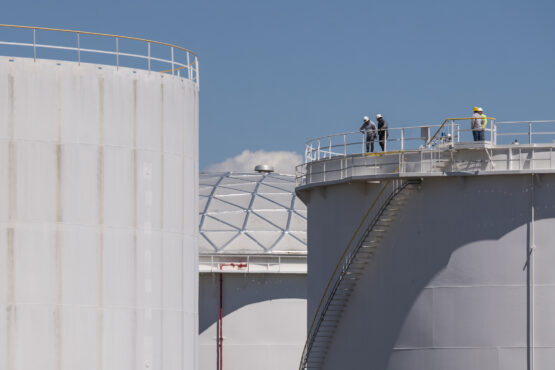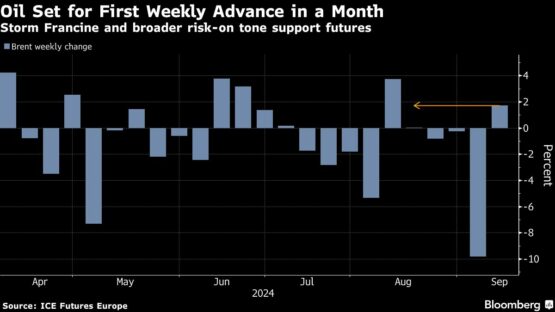Oil headed for its first weekly gain in a month as storm Francine disrupted crude production, and a risk-on tone swept across wider markets ahead of expected Federal Reserve interest-rate cuts.
Brent crude rose above $72 a barrel, advancing for a third session and pushing its weekly climb to almost 2%, while West Texas Intermediate was below $70. The storm — which weakened from its previous hurricane force — had spurred a sizable shut-in of production in the Gulf of Mexico. In broader markets, equities rallied as the dollar declined, a boost for commodities including crude.
Crude remains 16% lower this quarter on concerns about a dimming demand outlook in top importer China. The International Energy Agency said that global consumption growth in the first half was the lowest since the pandemic as China’s economy cooled, according to its monthly report. Against that backdrop, producer cartel OPEC+ has opted to defer a plan to relax supply curbs.
Chinese demand contracted in July for a fourth straight month, and fuel use elsewhere is “tepid at best,” the IEA report said. The outlook appears even weaker for next year, when there will be a surplus each quarter even if OPEC+ abandoned plans to gradually start restoring halted supplies, it added.
“The overriding themes for the remainder of the year are weakening Chinese demand, and OPEC+’s subsequent strategy around potentially defending market share in this tepid demand environment,” said Vivek Dhar, an analyst at Commonwealth Bank of Australia.
Timespreads show a mixed picture. While Brent’s prompt spread — the gap between the two nearest contracts — strengthened in line with futures this week, it’s still narrower compared with a month ago. The figure was last at 57 cents a barrel in backwardation, compared with 76 cents a month ago.
The Fed is widely expected to start cutting US interest rates at its meeting next week after inflation cooled and signs of a labor market slowdown emerged, and there’s speculation that policymakers may opt for a 50-basis-point reduction. Lower borrowing costs may support growth and wider energy demand.
| Prices: |
|---|
|
© 2024 Bloomberg
Follow Moneyweb’s in-depth finance and business news on WhatsApp here.























COMMENTS 0
You must be signed in to comment.
SIGN IN SUBSCRIBE
or create a free account.
Free users can leave 4 comments per month.
Subscribers can leave unlimited comments via our website and app.